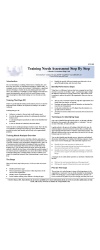Mismanaging Stress Causes Loss of Leader Effectiveness (Burnout)
Perhaps the most common reason some leaders go from effective to ineffective relates to the amount of stress they experience, and their lack of ability to manage that stress. This is particularly true of leaders in formal positions of power and high responsibility, and increases as the consequences of their actions increase in severity.
In effect, some leaders simply burn out. Obviously this is a complex subject, but below are some behaviors and characteristics of leaders who burn out:
- Due to perceived time pressures leaders at risk of burnout tend to let their personal support systems erode, resulting in their feeling they are carrying the load on their own.
- An unwillingness to delegate authority and responsibility increases risk of burnout. Sharing control is not necessarily giving up control.
- Leaders who cannot separate their “leadership” lives from their personal lives are also at higher burnout risk. Also, neglect of family and friends become risk factors.
- Related to the point above, leaders who define themselves, and their own sense of self-worth in terms of their performance as leaders are also at high risk of leadership, or executive burnout.
- Some people are simply not cut out for the stress levels that can occur in formal leadership positions. There is no shame in identifying this in oneself, and choosing to leave the situation, rather than to make leadership mistakes and damage self, the organization and people in the organization. Self-monitoring and self-awareness are important here.
- A lack of peer support can contribute to burnout risk, particularly at executive and CEO levels. Senior executives have few peers within an organization to share their experiences and vent, or from which to elicit advice. That can create a sense of loneliness and isolation. Making the effort to interact with peers, through professional associations, conferences, and establishing personal relationships with peers is important.
- Lack of self-awareness can be a problem. Burnout doesn’t simply occur out of nowhere but begins slowly and insidiously, often without the leader being aware the process is going on. Leaders need to pay attention to their stress levels, and identify when and if they need to change how they do things before burnout progresses too far. In other words leaders should consciously create anti-burnout strategies for themselves to prevent burnout.






